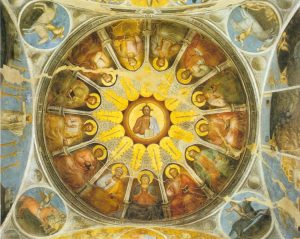 At Mass this weekend, be sure to hear the parallel between the parable (Matthew 25, 14-30) and the actual experience of Jesus and His disciples. The master was going away. They did not know why or where, but he was leaving for a long time. He left his trusted servants in charge, and wanted them to act on his behalf. There were no further instructions, but they were to continue his work. If he had wanted that money buried, he could have done that himself, but he expected to “reap what he did not sow.”
At Mass this weekend, be sure to hear the parallel between the parable (Matthew 25, 14-30) and the actual experience of Jesus and His disciples. The master was going away. They did not know why or where, but he was leaving for a long time. He left his trusted servants in charge, and wanted them to act on his behalf. There were no further instructions, but they were to continue his work. If he had wanted that money buried, he could have done that himself, but he expected to “reap what he did not sow.”
Do we understand that Jesus is the “master” and we are the “trusted servants?” St. Matthew composed his Gospel at a time when his community was still very much aware both of the Master’s absence (after Christ’s Ascension), and yet also aware that He would come again. Centuries later, we hear the same story on an autumn Sunday in a season which constantly reminds us of the “harvest,” the account for our actions (which we servants will have to give). There is a danger, however, that after all this time we will forget that the Master will return. In these intervening centuries, what have we learned about what to do until He returns?
Are we at risk of either forgetting or, worse, ignoring what we have learned from the Master about forgiveness, inclusiveness, generosity, and hospitality? Are we at risk of falling into the thinking that it is easier for us to do nothing and pass the blame to someone else?
Looking ahead: when we gather next week, a complete cycle of the Church’s year will be completed, and the image of Christ, a King coming in glory, ought to make us a little anxious to consider once again what we have done with what has been entrusted to us. In all seriousness, how well we have imitated the Master? Are we awaiting His return with a longing for our own triumphant glory … or are we getting ready to celebrate His return with humble gratitude?

